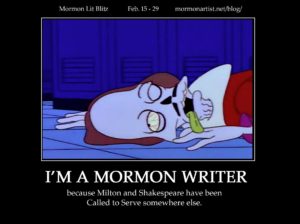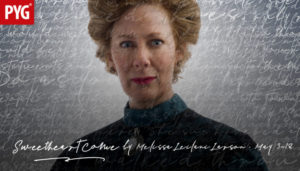 Originally appeared as a @JamesGoldberg Twitter thread.
Originally appeared as a @JamesGoldberg Twitter thread.
Got a little time today between getting kids to school and working on work. Time for “The Mormon Shakespeare: A Thread.”
Many Mormons have heard some variant on the aspirational statement that we, as a community will (or ought to) have a Shakespeare of our own.
The idea that great literary work should flow from our community’s discipleship is baked right in to early formulations of our Zion vision. Don’t have the citation handy, but Sidney Rigdon made this claim in Kirtland. He was not alone in the sentiment.
The scriptural basis is the recurring image of Zion putting on her beautiful garments. People like Rigdon felt like language would and should be part of that beauty. They imagined it would draw people to Zion. Big dream.
The formulation that “We will yet have Miltons and Shakespeares of our own” is 2nd generation. It comes from a sermon by Orson F. Whitney in 1888. http://mldb.byu.edu/homelit.htm
The dream of drawing people to Zion through literature is still there, but the historical context is different. Whitney is speaking during the “home literature” movement, when the practical emphasis is on literary independence.
In that period, Mormons are fighting to retain some of their economic independence–what they call “home industry”–and writers tap into that notion, arguing that cultural production should happen locally, within the community, too.
There’s something delightfully revolutionary about this marginalized group, increasingly under the boot of a hostile government at the time, staking a claim to their own cultural production.
“God’s ammunition is not exhausted,” Whitney says. “In God’s name and by his help we will build up a literature whose top shall touch heaven, though its foundations may now be low in earth. Let the smile of derision wreathe the face of scorn.”
Dear Reader: this is not a plan. It’s defiance. Inspired defiance, maybe. Beautiful defiance, certainly. But it’s not a plan.
This non-plan is still basically the plan of literary-leaning Mormon writers. We have more literary institutions and history than I find it reasonable to expect for a community of our size and age, but that’s not much. For most of us, defiant aspiration is the only plan.
Trying to leave an artistic legacy without a strong infrastructure for reaching an audience, let alone earning a living, can wear on you. I’ve felt it. I get it.
After a reading a particularly stupid review of her latest film, @mel_leilani–a powerful, moving playwright who’s gone more than once into the breech to build a meaningful Mormon literary discourse–was ready to throw in the towel and referenced Whitney’s Shakespeare quote.
 Melissa Leilani Larson @mel_leilani 22 hours ago
Melissa Leilani Larson @mel_leilani 22 hours ago
I have a play opening tomorrow night, and it’s good. It’s difficult and interesting and tells a woman’s story. It’s incredibly well acted and directed and designed. And it doesn’t have a Mormon thing about it. And I’m relieved.
The reason we don’t have a Mormon Shakespeare is that the Mormons can’t handle it. Period.
 [Melissa Leilani Larson’s world premiere play “Sweetheart Come” is being produced by the PYGmalion Theatre Company, May 3 to May 18 at Rose Wagner Performing Arts Center, SLC. “Emma Hauck realizes that her husband’s political ambitions are changing him—and their marriage. She finds refuge in her writing, and in the unexpected friendship of a new servant. As both relationships grow more complex, Emma must face difficult truths about herself that she never knew existed. Inspired by a heartbreaking true story, this new play explores the intersection between marriage, illness, and the power of a pencil.” Shows take place on Thursdays, Fridays and Saturdays at 7:30 p.m. and on Sundays at 2:00 p.m., with an extra matinee on the final Saturday at 2:00 p.m.]
[Melissa Leilani Larson’s world premiere play “Sweetheart Come” is being produced by the PYGmalion Theatre Company, May 3 to May 18 at Rose Wagner Performing Arts Center, SLC. “Emma Hauck realizes that her husband’s political ambitions are changing him—and their marriage. She finds refuge in her writing, and in the unexpected friendship of a new servant. As both relationships grow more complex, Emma must face difficult truths about herself that she never knew existed. Inspired by a heartbreaking true story, this new play explores the intersection between marriage, illness, and the power of a pencil.” Shows take place on Thursdays, Fridays and Saturdays at 7:30 p.m. and on Sundays at 2:00 p.m., with an extra matinee on the final Saturday at 2:00 p.m.]
I love Mel and her work and I told her so last night. I also told her that this formulation frustrates me whenever I see it.
We have bought in to a crazy aspirational statement. It’s neither fair nor helpful to blame the audience–especially in a way that borrows and magnifies stereotypes about our own community–when the crazy aspirational work is driving us crazy.
Of course there is a gap between the reception a 21st century working writer gets and the reception we give to the most revered writer in the history of the English language. Of course.
Take a step back for a moment. Take a deep breath. Let’s talk about how Shakespeare got his centuries-long reception of honor. Was it because of an audience that was unequivocally supportive at the time?
Is it because Shakespeare was simply the greatest natural talent of the past five centuries?
I don’t think so. I think Shakespeare is an awesome–though uneven–writer who was lucky enough to live in a time when patronage and audience pay structures combined to let him have a pretty reliable career with fairly low opportunity cost, his alternative being the range of other jobs available in Elizabethan England.
As far as how he became the Great Writer in the History of the English Language (TM), though, I find it exceptionally convenient that his career starts right after the defeat of the Spanish Armada.
Shakespeare lucked in to writing a series of steady gigs right at the time when his nation was forming a new identity. His writing, which was often exceptional, became legendary not because of support from the audience but because of sweet historical timing.
Sometimes the timing that leads to legendary status is not sweet. One of the most read and honored writers of the 20th century is Anne Frank.
We’re not drawn to Anne Frank because she’s the most technically skilled writer of her era. She just happened to speak in a voice that sets the senseless destruction of an entire world into sobering relief.
I would not wish either path to legendary status on anyone. As @motleyvision points out, Shakespeare’s status is tied up in Britain’s subsequent rise to empire. Greatness, in part, by gun. And Anne Frank’s status came at a price we would all wish undone.
To the extent that Mormons have our own acknowledged literary legends, it’s because they’re tied to key moment in our historical and spiritual narrative. Think hymns with history: Phelp’s “The Spirit of God,” Snow’s “O My Father,” Clayton’s “Come, Come Ye Saints.”
I absolutely wish our current infrastructure for artistic production was better. I love small Mormon presses. I have a certain respect for the people who have kept Deseret Book kicking in a tough era for publishers.
Cool things are happening now between Mormon painters and their beautiful network of patrons. I’m jealous–but not so jealous I can’t appreciate their work. 😉
I am also jealous of the discourse space and the community infrastructure that’s built up around Mormon history.
I am–if I can confess an ugly weakness–more bitterly jealous there because I hitched a ride and have to deal with the gulf between the support for my colleagues’ passion and mine on a daily basis.
That’s not the fault of anyone in particular, though. We are all caught up in larger trends in terms of the categories that gain currency. We are, in our own way, still like Orson F. Whitney preaching aspirational defiance under the boot of powers that can casually crush us.
But oh, dear reader, that is what I signed up for. Even if I were a better writer–even if I were, for example, @mel_leilani freaking Larson!–I would not even be remotely in the Shakespeare race.
But in the face of empires and powers and the almost irresistible gravitational pull of a dominant discourse, I can speak my own language.
I can shout it like a madman into the wind.
And–if we are totally honest–I wouldn’t gain much if I traded that crazy aspiration away.
Read recently that the median annual book royalty income for American authors is $3,100 per year.
The grass just ain’t that green on the other side, friends.
And the only way to avoid angry one-star reviews is to write a book no one cares about enough to pan.
So yeah, I get it. It’s tough to build up a niche, marginalized cultural discourse. It’s tempting to wish for more consistent or intense audience support. And we pay a price for unrealistic aspirations to a kind of greatness that turns out to be historically contigent.
Because there are real differences and tensions between our community and the dominant culture, it’s easy to judge and pathologize our audience. To attribute artistic pain points to their real and perceived shortcomings.
But friends don’t let friends. Etc.
Just say no to colonizing self-shame.
I mean that: just say no to colonizing self-shame. And that bring us, appropriately, to 42 (tweets). Douglas’s Adams answer to finding meaning in a frustrating absurd world. 😉
Editor’s notes: Please also see:Mette Ivie Harrison. “The Aborted Legacy of Mormon Art, or Why there will be no Mormon Shakespeare“. The comments include lots of discussion of the Shakespeare quote, including replies from James, Scott Abbot, Michael Austin, Wm Morris, Emily Debenham, Jennifer Quist, and more.
Also see Eric Samuelsen’s discussion of Shakespeare, the Whitney quote, and Mormon literature, in “Three Mormon Playwrights: Neil LaBute, Tim Slover, Melissa Leilani Larson“
